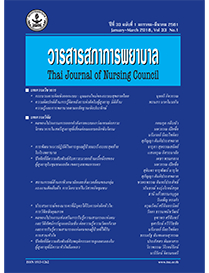Effects of Self-Effcacy-Promoting Programme with Cartoon Animation Videos on Knowledge, Anxiety, and Perceived Self-Effcacy in Patients Undergoing Cardiac Catheterisation
Keywords:
knowledge, self-effcacy perception, anxiety, cardiac catheterisationAbstract
Abstract
Objective: To examine the effects that a self-effcacy-promoting programme adopting
cartoon animation videos could have on the knowledge, anxiety, and perceived self-effcacy
in patients undergoing cardiac catheterisation.
Design: Two-group experimental research with a pre-test and post-test.
Procedure: This study was conducted on 39 cardiovascular patients who had undergone
catheterisation. Based on the order of their queue cards, the patients were randomly assigned to
an experimental group and a control group. The experimental group was treated with a self-effcacypromoting programme that adopted cartoon animation videos, pamphlets, and home visits.
The control group received standard care. Each patient was asked to respond to a personal
information questionnaire and 3 pairs of pre-tests and post-tests, each designed to measure
the patient’s knowledge, anxiety, and self-effcacy perception before the experiment and 2 times
(the frst day and the fourth week) after cardiac catheterisation. Data were analysed using
descriptive statistics, a paired t-test, an independent t-test, and two-way ANOVA with repeated measures on one factor.
Results: After the experiment, the experimental group displayed signifcantly higher average
scores on knowledge and self-effcacy perception (p = .001, p < .001), and a signifcantly lower
anxiety level (p < .001), on the frst day and in the fourth week after cardiac catheterisation.
However, no signifcant difference was found between the 2 groups’ average pre- and postexperimental knowledge scores, self-effcacy perception scores, and anxiety levels.
Recommendations: It is recommended that this cartoon-animation-integrated self-effcacypromoting programme be used as an intervention to enhance self-effcacy perception and promote
self-care behaviour, both of which could prevent complications in cardiac catheterisation patients.
Downloads
References
2. Strategy and Planning Division Ministry of Public Health. Public health statistics. Bangkok: wvo thai printing; 2014. (In Thai).
3. Central Chest Institute of Thailand. Coronary artery disease statistics. Bangkok: Sukhumvitprinting;
2014. (In Thai).
4. Hengrussamee K, Jamsomboon K. Clinical Practice Guideline in ST-elevation myocardial infarction (STEMI). Central Chest Institute of Thailand. Bangkok: Sukhumvitprinting; 2012. (In Thai).
5. Thai Heart Association. Clinical Practice Guideline in Percutaneous Coronary Intervention (PCI); 2008.
(In Thai).
6. American Heart Association. Cardiac medication. Available form: URL: https://www.heart.org/idc/ group/heartpublic/@wcm/docoments/downloadable/ucm_304568.pdf; 2010.
7. Moojun S. Evidence review on best practices of psychological interventions for persons undergoing cardiac catheterization. (Master of Nursing Science Thesis) Chiangmai: Chiangmai University; 2012. (In Thai).
8. Reed T. Reducing patient anxiety pre-cardiac catheterization through education. [abtract]. Cath Lab Digest 2008; 16(6): 11-14.
9. Gallagher R. Pre-procedural concerns and anxiety assessment in patients undergoing coronary angiography and percutaneous coronary interventions. Eur J Cardiovasc Nurs 2010; 9(1): 38-44.
10. Champawong S. Eeffect of information giving program about stimuli on adaptation in coronary artery disease patients post percutaneous coronary intervention. (Master of Nursing Science Thesis). Khonkaen: Khonkaen University; 2009. (In Thai).
11. Chuanwanpete K, Suksawat S, Suthipong N, Aunwong A. Comparison between group learning discussion and demonstration video for knowledge concern in cardiac cath patients. Chest Disease Institute. Nonthaburi: 2009. (In Thai).
12. Bandura A. Self-effcacy: The exercise of control. Newyork: W.H. Freeman; 1986.
13. Mayer RE. Multimedia Learning. 2nded. New York: Cambridge University; 2009.
14. Cohen J. Statistical Power Analysis for the Behavior Sciences. 2nded. New Jersey: Lawrence Erlbaum Associates; 1988.
15. Prompiw S, Tumnong C, Wongkpratoom S, Wongvipaporn C. The effects of a perceived self-effcacy program on the exercise and diet behaviors of patients with acute coronary syndrome post percutaneous coronary intervention. Journal of Nursing and Health Care 2015; 33(1): 23-33. (In Thai)
16. Keawkungwan J, Singhasiwanon P. Textbook of Clinical Research. Bangkok: amarin printing and publishing; 2011. (In Thai)
17. Kaveevivitchai C. Enhancing nursing students’ skills in vital signs assessment by using Multimedia Computer-Assisted Learning with integrated content of anatomy and physiology. Nurse Educ Today JnI 2009; 29(1): 65-72.
18. Somsiri V, Susang J. The effects of givingplannedinstruction on knowledge, perceivedself care abilities and self-care behavior in coronary heart disease patients receiving percutaneous coronary intervention at Songkhlanakarind Hospital. Princess of Naradhiwas University Journal 2011; 3(3): 33-46. (In Thai).
19. Nursing division Ministry of Public Health. Nursing care in Patients Coronary artery disease. Nonthaburi: 2007. (In Thai).
20. Raungratanaamporn S. The study of health perception and anxiety in patients with coronary artery disease
undergoing cardiac investigations. (Master of Nursing Science Thesis). Bangkok: Mahidol University;1999. (In Thai).
21. Srichantaranit A, Chungsomprasong P, Vijarnsorn C,Sukthongsa W, Udomponglukana N, Jaturachaidech C. Comparing the effects of teaching with VCD and teaching with flip chart on knowledge and anxiety of mothers in caring for children undergoing cardiac catheterization. Journal of Nursing Science 2014; 32(2): 41-51. (In Thai).
22. Jamshidi N, Abbaszadeh A, Kalyani M. N. Effects of video information on anxiety. stress and depression of patients undergoing coronary angiography, Pakistan. J Med Sci 2009; 25(6): 901-05.
23. Ruffnengo C, Versino E, Renga G. Effectiveness of an informative video on reducing anxiety levels in patients undergoing elective coronarography: An RCT. Eur J Cardiovasc Nurs 2008; 8(25): 57–61.
24. Sartsamai A. The effects of self-effcacy enhancement in cardiac rehabilitation program on self-care behavior among patients undergoing percutaneous transluminal coronary angioplasty. (Master of Nursing Science Program in Advanced Thesis). Bangkok: Saint Louis College; 2008. (In Thai).








